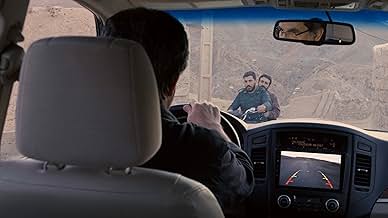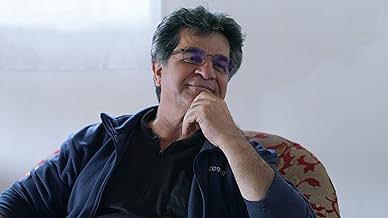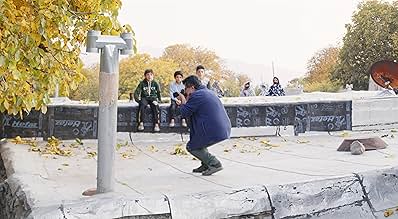AVALIAÇÃO DA IMDb
7,2/10
4,6 mil
SUA AVALIAÇÃO
Um retrato de duas histórias de amor contadas em paralelo. Em ambas, os amantes são afetados por obstáculos ocultos e inevitáveis, pela força da superstição local e pelos mecanismos do poder... Ler tudoUm retrato de duas histórias de amor contadas em paralelo. Em ambas, os amantes são afetados por obstáculos ocultos e inevitáveis, pela força da superstição local e pelos mecanismos do poder.Um retrato de duas histórias de amor contadas em paralelo. Em ambas, os amantes são afetados por obstáculos ocultos e inevitáveis, pela força da superstição local e pelos mecanismos do poder.
- Prêmios
- 4 vitórias e 8 indicações no total
Bakhtiyar Panjeei
- Bakhtiar
- (as Bakhtiar Panjei)
Narges Delaram
- Ghanbar's mother
- (as Narjes Delaram)
Reza Heidari
- Reza
- (as Reza Heydari)
Aliye Tuzun
- Police
- (as Aliye Tüzün)
Avaliações em destaque
The film "No Bears" starts off simple but becomes more complex as it progresses. Even if you're not familiar with the work of Kiarostami and Makhmalbaf, you can still enjoy it. The director, Panahi, mixes documentary-style and autobiographical elements to create a powerful emotional impact. Panahi, who is at the center of the film, is forced to confront the consequences of his work, both for himself and his collaborators. The final image of the film is sobering and resonates with the unspoken anguish of an artist exiled in his own country, who has had enough. It is clear that the director has little left to lose, and this makes "No Bears" one of the best movies of the previous year.
Film director Jafar Panahi is prohibited from leaving Iran, but is trying to make a film in neighbouring Turkey. In order to make that work, he moves to a remote village near the border, where the communications are a bit hit and miss. With the help of his obliging host "Ghanbar" (Vahid Mobaseri), though, he tries to make the best of it. Initially, it's a friendly village but when he takes (or doesn't!) a photograph of a young couple, he finds himself drawn into an increasingly acrid stand-off between two young men, and their families, to whom a girl may have been betrothed when her umbilical cord was cut. His frustrations with these encroachments are not helped by production difficulties with the two two stars of his documentary-style film - real life lovers who are trying to find a way to escape, safely, to Paris. There is the slightest hint of menace here as the plot develops and although we see little actual evidence, there is a distinct sense that this man is increasingly unwelcome, despite the platitudes from the villagers, encouraging a sixth-sense feeling that the authorities are distantly watching this film-maker. There is a distinct perception of intimidation! What is also clear is that these ordinary Iranian people live in fear of the police, the Revolutionary guard and that rather flies in the face of their genuine, peaceable and hospitable, nature. Now, perhaps Panahi's less-is-more style works for some, but for me I found this all rather a slow watch. He shuffles around with little useful dialogue to develop his on-screen persona, nor my interest in him. Clearly this is a story about freedom and a sort of subliminal oppression but somehow the characters themselves here didn't really develop that theme sufficiently, nor did they really engage me. The ending, too, is disappointing and inconclusive in equal measure and I was rather underwhelmed. The film does offer us an interesting depiction of rural life that probably hasn't changed in millennia, but somehow I felt little better than a fly on the wall with nowhere near enough to go on to join in. Perhaps just too much of this is predicated on a knowledge by the audience of this director and of his relationship with his government.
A most excellent movie ! Thoroughly enjoyed it. For sure there were many layers and implicit meanings I missed but that is also what made this film so intriguing. The contrast between the mountain town in Iran and the city in Turkey, all the details, the character extras that clearly showed the cultural differences, I loved that. The border, the trafficking that was implied, the faithfulness to truth of the central actor who is also the director. It's also a movie that celebrates movie making, how storytelling prevails in film, the impact of a story upon the storyteller. It´s a very poignant movie.
Wonderful footage in a documentary style, great story, amazing insight into life on the frontier.
Well worth seeing.
Wonderful footage in a documentary style, great story, amazing insight into life on the frontier.
Well worth seeing.
Director Jafar Panahi is midway in his imprisonment/house arrest in Iran, a victim of a relentless Islamic theocracy. That little matter hasn't kept him from making five films, sometimes using technology to direct remotely, for instance, his current "No Bears," in which he depicts himself directing a film within the film. Directing a Turkish town from a place near the Iranian border lends a romance to an otherwise mortally-dangerous enterprise.
His films show how he fights the restrictions of the regime on his art. All five in some way or another may reveal his oppression and lack of artistic autonomy. Panahi's films reflect his late mentor, Abbas Kiarostami, and his challenging tension between "narrative" and "documentary," when a camera seems to play between fiction and reality.
Because he hasn't been allowed to leave Iran for 10 years, his movies have a cachet usually relegated to an artistic outlaw: "This Is Not a Film," "Closed Curtain," "Taxi" and "3 Faces" are almost classics. New Yorker magazine says "No Bears" is one of the best dramas of the year, and they're right.
In No Bears, after a wild opening in which an exiled Iranian couple argue in the street about a corrupt passport and escape into Europe, we realize it's a scene from the movie he is remotely directing. Then we are thrown into a Romeo and Juliet mash up that leaves Panahi's director at the mercy of local forces, both official and citizenry, who lay tradition and family rumbling at his feet for a photo disc he allegedly has that would resolve a fight over an arranged marriage.
Panahi's director claims he has no such compromising photo of the couple, but he shows little respect for the local traditions inherent in the love affair. Underneath, of course, is his comment on cinema as a means of discerning truth in a culture of fake news. The scene of Panahi feverishly looking for cellphone reception smartly underscores the struggle to find truth.
At the least, No Bears is a profound statement about the power of filmmaking as it clashes with custom and reality. It is a masterful meta-fiction that tells a complicated cultural tale and the fraught participation of cinema. 80 for Brady it is not.
His films show how he fights the restrictions of the regime on his art. All five in some way or another may reveal his oppression and lack of artistic autonomy. Panahi's films reflect his late mentor, Abbas Kiarostami, and his challenging tension between "narrative" and "documentary," when a camera seems to play between fiction and reality.
Because he hasn't been allowed to leave Iran for 10 years, his movies have a cachet usually relegated to an artistic outlaw: "This Is Not a Film," "Closed Curtain," "Taxi" and "3 Faces" are almost classics. New Yorker magazine says "No Bears" is one of the best dramas of the year, and they're right.
In No Bears, after a wild opening in which an exiled Iranian couple argue in the street about a corrupt passport and escape into Europe, we realize it's a scene from the movie he is remotely directing. Then we are thrown into a Romeo and Juliet mash up that leaves Panahi's director at the mercy of local forces, both official and citizenry, who lay tradition and family rumbling at his feet for a photo disc he allegedly has that would resolve a fight over an arranged marriage.
Panahi's director claims he has no such compromising photo of the couple, but he shows little respect for the local traditions inherent in the love affair. Underneath, of course, is his comment on cinema as a means of discerning truth in a culture of fake news. The scene of Panahi feverishly looking for cellphone reception smartly underscores the struggle to find truth.
At the least, No Bears is a profound statement about the power of filmmaking as it clashes with custom and reality. It is a masterful meta-fiction that tells a complicated cultural tale and the fraught participation of cinema. 80 for Brady it is not.
Telling the truth is difficult for Iranian filmmakers. You have Government control on one hand (the real tale of Panahi remotely directing a film being shot in Turkey while stationed on the borders of Iran as he is not allowed to leave the country) and you have quaint traditions on the other (in the Iranian villages on the border) that often lead to tragedy. However good your intent, the road is bumpy and leads you to a sad, nihilistic end. Intelligent filmmaking that captures the difficulty of renowned filmmakers to capture the Kafkesque ground reality in Iran and the frustrations of Iranian nationals today. Deserved the Special Jury Prize at Venice.
Você sabia?
- CuriosidadesActually, the entire scene shot in Istanbul Kadikoy, not in Turkish border town.
Principais escolhas
Faça login para avaliar e ver a lista de recomendações personalizadas
- How long is No Bears?Fornecido pela Alexa
Detalhes
Bilheteria
- Faturamento bruto nos EUA e Canadá
- US$ 167.333
- Fim de semana de estreia nos EUA e Canadá
- US$ 6.173
- 25 de dez. de 2022
- Faturamento bruto mundial
- US$ 1.196.288
- Tempo de duração1 hora 46 minutos
- Cor
- Proporção
- 1.85 : 1
Contribua para esta página
Sugerir uma alteração ou adicionar conteúdo ausente
























